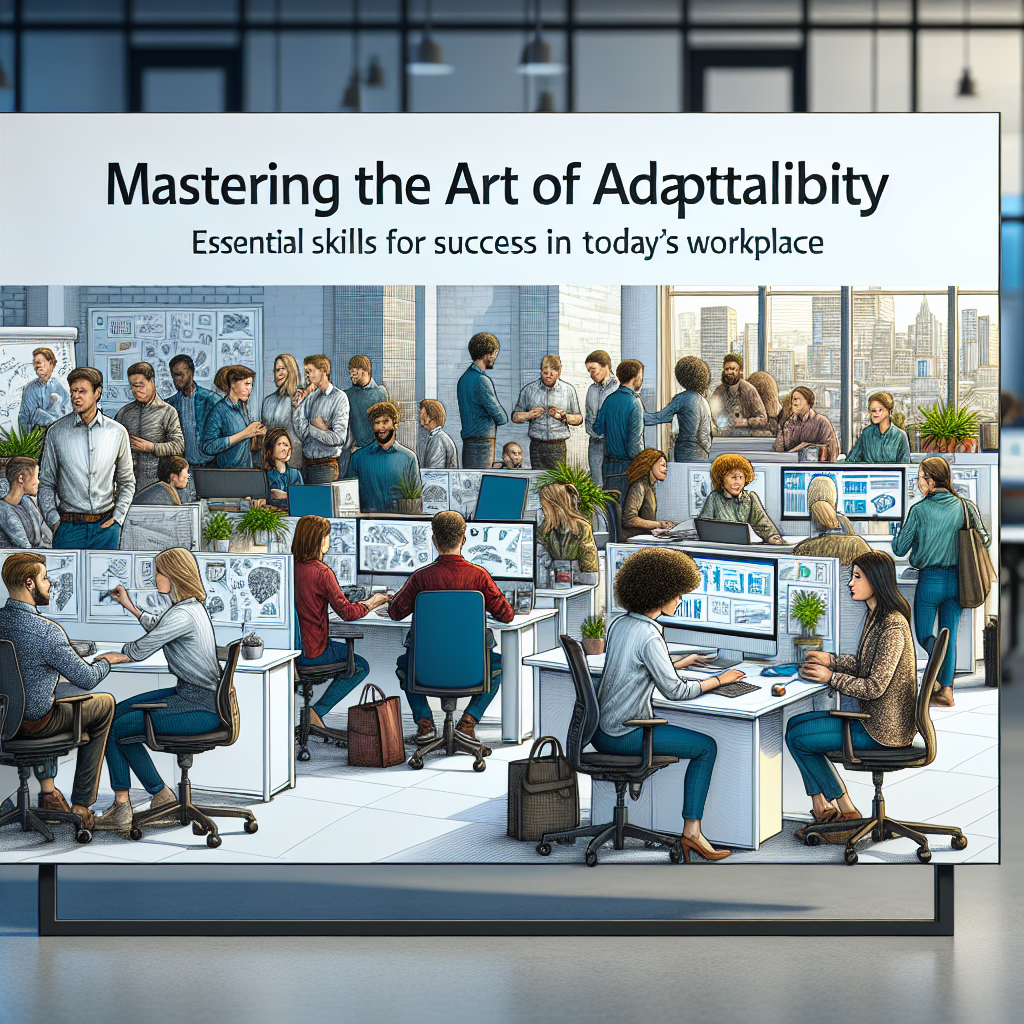In today’s rapidly changing and unpredictable workplace, adaptability has become a critical skill for success. The ability to quickly adjust to new situations, challenges, and opportunities is what sets the most successful professionals apart from the rest. Whether you are an entry-level employee or a seasoned executive, mastering the art of adaptability is essential to thrive in today’s fast-paced business environment.
Adaptability is the ability to respond effectively to change and uncertainty. It involves being flexible, open-minded, and willing to learn new skills and ways of working. In a world where technology is constantly evolving, market conditions are always shifting, and global competition is fierce, being able to adapt quickly and effectively is crucial for staying relevant and competitive in the workplace.
So, how can you develop and master the art of adaptability in today’s workplace? Here are some essential skills and strategies to help you navigate and thrive in an ever-changing business landscape:
1. Embrace Change
The first step to mastering adaptability is to embrace change and see it as an opportunity for growth and self-improvement. Instead of resisting change or fearing the unknown, try to approach new situations with an open mind and a positive attitude. Challenge yourself to step out of your comfort zone and embrace new challenges and opportunities that come your way.
2. Stay Agile
Adaptability is all about being agile and flexible in your approach to work. Be willing to try new things, experiment with different strategies, and learn from both successes and failures. Develop a growth mindset that allows you to see setbacks as learning opportunities and motivates you to keep pushing forward despite obstacles.
3. Develop Strong Communication Skills
Effective communication is key to adaptability. Being able to clearly communicate your ideas, thoughts, and concerns to colleagues and supervisors will help you navigate change more successfully. Practice active listening, ask for feedback, and seek clarification when needed to ensure that everyone is on the same page and working towards common goals.
4. Build a Strong Network
Having a strong professional network can be a valuable asset when it comes to adapting to new challenges and opportunities in the workplace. Cultivate relationships with colleagues, mentors, and industry peers who can provide guidance, support, and valuable insights to help you navigate change more effectively.
5. Prioritize Continuous Learning
In a fast-paced business environment, staying up-to-date with the latest trends, technologies, and best practices is crucial for success. Make a commitment to lifelong learning and professional development by taking courses, attending workshops, and seeking out opportunities to expand your knowledge and skills.
6. Be Resilient
Resilience is the ability to bounce back from setbacks and adversity. Developing resilience will help you navigate challenges and obstacles with grace and determination. Practice self-care, mindfulness, and stress management techniques to build your resilience and cope with the inevitable ups and downs of the workplace.
7. Embrace Diversity and Inclusion
In today’s global marketplace, diversity and inclusion are essential for success. Embracing different perspectives, backgrounds, and experiences will help you see the world from a broader lens and adapt more effectively to the diverse challenges and opportunities in the workplace. Be open-minded, inclusive, and respectful of others’ perspectives to foster a culture of innovation and collaboration.
By mastering the art of adaptability, you can position yourself for success in today’s dynamic and competitive workplace. Remember that adaptability is not a one-time achievement but a continuous process of growth and learning. By developing and honing your adaptability skills, you can navigate change with confidence, resilience, and agility to achieve your professional goals and thrive in the ever-changing business landscape.
FAQs:
Q: What are the benefits of being adaptable in the workplace?
A: Being adaptable in the workplace has numerous benefits, including increased productivity, improved problem-solving skills, enhanced creativity, better communication, and a greater ability to handle stress and uncertainty. Adaptable professionals are more likely to succeed in today’s fast-paced and competitive business environment.
Q: How can I improve my adaptability skills?
A: To improve your adaptability skills, focus on developing a growth mindset, embracing change, staying agile, building strong communication skills, prioritizing continuous learning, developing resilience, and embracing diversity and inclusion. Practice mindfulness, self-care, and stress management techniques to build your resilience and cope with the ups and downs of the workplace.
Q: What are some common challenges to adaptability in the workplace?
A: Some common challenges to adaptability in the workplace include resistance to change, fear of the unknown, lack of communication, lack of support from colleagues and supervisors, and a rigid mindset. Overcoming these challenges requires a willingness to learn, grow, and embrace new opportunities with an open mind and a positive attitude.
Q: How can I adapt to a new role or responsibilities in the workplace?
A: To adapt to a new role or responsibilities in the workplace, take the time to understand your new duties, responsibilities, and expectations. Seek feedback and guidance from colleagues and supervisors, ask for help when needed, and be proactive in seeking out opportunities for growth and development. Stay agile, flexible, and open-minded to adapt to the challenges and opportunities of your new role successfully.





Leave A Comment